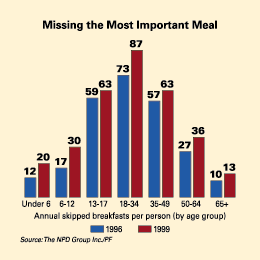
Time to Eat
Americans are spending less time than ever at meals, according to a number of recent surveys. The primary restriction to dining seems to be a lack of time. Breakfast, long touted as the most important meal of the day, is the biggest loser, as busy lifestyles take their toll on the morning meal.Traditional breakfast staples, such as eggs, bacon and waffles, are more likely to appear on the table on weekends, when people have time to cook. However, almost 80% of all breakfasts continue to be made at home, according to a study by the NPD Research Group.
During the week, breakfast is more likely to consist of something portable--27% of kids carry breakfast to school, camp, practice, etc. Nevertheless, younger children are reportedly the heaviest eaters of waffles, pancakes and French toast.
In a survey of its members, Bally Fitness found two-thirds of respondents skipped breakfast at least once a week. In addition, the amount of time allotted to each meal decreased as well, with half of the respondents spending less than 15 minutes at lunch--and "even bleaker" numbers for breakfast.
A Welcome Addition
Food companies are well aware of the public's taste for healthy additions to their standard fare, and a number of new products echo that fact. Calcium in orange juice, vitamin C in ketchup, vitamin D in lowfat yogurt for children--even this month's announcement of calcium-enhanced spaghetti--are all examples of that trend. One nutrient, however, has gone largely unnoticed until now.Potassium, though not among the most consumed supplements and one of the least noticed among major marketing efforts, has been found to offer a substantial health benefit. The FDA has authorized a new health claim touting the benefits of the nutrient: "Diets containing foods that are good sources of potassium and low in sodium may reduce the risk of high blood pressure and stroke."
The claim has been approved for Tropicana Pure Premium orange juice and, scientists hope, may educate consumers of potassium's benefits.
"We have known that potassium is a key player in blood pressure and stroke regulation for some time, but this message has not reached our patients," commented Lawrence Appel, M.D., associate professor of medicine at Johns Hopkins University. "So much of what people know about nutrition today comes from what they read on food labels. This new health claim will be a tremendous help in teaching people about potassium's benefits."
Top Dietary Supplements for those Aged 50+
- Multivitamins
- Vitamin E
- Calcium
- Vitamin C
- Garlic
- Ginkgo Boloba
- Glucosamine
- Zinc
- Vitamin B Complex
- Potassium
- Magnesium
- Vitamin B12
- Selenium
- Folic Acid
- Beta Carotene